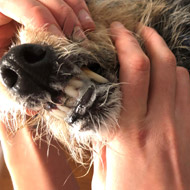Dog’s teeth glued together after chewing on a flyer

Oscar was given a general anaesthetic so that vets could remove the “paper mâché-like” substance.
A dog found himself in a sticky situation after chewing on a glossy leaflet that left his teeth glued together.
Ten-year-old Oscar had to be rushed to the vets for emergency treatment after he was unable to open his mouth. The Jack Russell was given a general anaesthetic so that vets could remove the “papier mâché-like” substance which had coated his jaws.
“Oscar was brought into us in an extremely distressed state. Chewing the leaflet had turned into a sticky wallpaper-like substance inside his mouth, which had glued his teeth together,” explained PDSA vet Rachel Smith.
“Once he was anaesthetised, we used our dentistry equipment to remove it from his mouth. Thankfully he made a good recovery and he was able to go home the same day.”
Owner Pat Finnerty said she had gone shopping with her daughter, and returned home around an hour later to find Oscar in an extremely anxious state.
“I brought him back a treat and he wanted to eat it, but he couldn’t open his mouth and there was all this saliva everywhere,” she said. “When I looked closer at his mouth, I could see that he couldn’t open his jaw but I didn’t know what it was.
“I then noticed a chewed up leaflet that must have been posted through the letterbox and realised what had happened.”
They contacted the PDSA and were advised to take Oscar to the Charity’s Blackpool Pet Hospital for emergency treatment. Pat said that she was hugely grateful for Oscar’s treatment and now takes extra care to prevent him from playing with the mail.
“He hasn’t learned his lesson and, given the chance, he still tries to get the post. I now take extra care to shut the door between the lounge and the front door when I go out. Oscar means the world to us, so I don’t want him getting into trouble again!”



 The latest
The latest